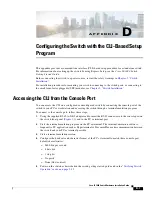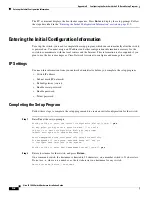
B-63
Cisco IE 3000 Switch Hardware Installation Guide
Appendix B Installation In a Hazardous Environment
Connecting the Switch to the AC-Input Power Supply
Connecting the AC-Input Power Supply to an AC Power Source
To connect the power converter to an AC power source, you need an AC power cord. Power cord
connector types and standards vary by country. Power-cord wiring color codes also vary by country. You
must to have a qualified electrician select, prepare, and install the appropriate power cord on the
PWR-IE50W-AC power supply.
Note
Use copper conductors only, rated at a minimum temperature of 167°F (75°C).
For the AC-input power supply equipped with an IEC C14 appliance connector (PWR-IE50W-AC-IEC),
you need to obtain an AC power cord with a suitable AC plug for your locality on one end and a C13
appliance connector on the other end. To connect source AC to the power supply, plug the AC power
cord appliance connector into the power supply AC in connector. Plug the other end of the AC power
cord into a dedicated source AC outlet.
Connecting the AC Power Cord to the Power Supply
This procedure is intended for a qualified electrician who has selected and prepared an appropriate AC
power cord for the PWR-IE50W-AC power supply.
Caution
AC power sources must be on dedicated AC branch circuits. Each branch circuit must be protected by a
dedicated two-pole circuit breaker.
Caution
Do not insert the power cord plug into the AC outlet until you have completed wiring the line, neutral,
and ground connections.
To connect the AC power cord wires to the power supply, follow these steps:
Step 1
Remove the plastic cover from the input power terminals and set it aside.
Step 2
Loosen the three Phillips-head terminal screws on the terminal block.
Step 3
Insert the exposed ground wire lead into the power supply ground wire connection on the terminal block.
Ensure that only wire
with
insulation
extends from the connector. Connecting AC Power to the Power
Converter
Step 4
Tighten the ground wire terminal block screw.
Note
The torque should not exceed 2.2 in-lb (0.25 Nm).
Step 5
Insert the line and neutral wire leads into the terminal block line and neutral connections. Make sure that
you cannot see any wire lead. Ensure that only wire
with
insulation
extends from the connectors.
Step 6
Tighten the line and neutral terminal block screws.
Note
The torque should not exceed 2.2 in-lb (0.25 Nm).
















































